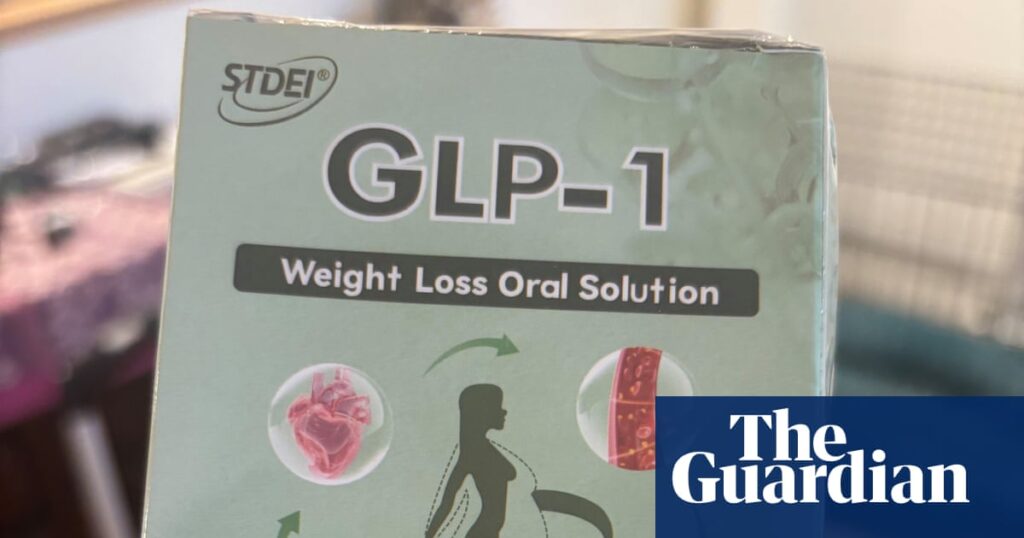A scam weight-loss treatment marketed to Australians as an “oral solution” that mimics the effects of Ozempic contains nothing more than a watery saline solution similar to eye drops, analysis has revealed.
Guardian Australia revealed last month that online “ghost stores” masquerading as Australian businesses had expanded into advertising weight-loss treatments and were impersonating real people to recommend their products.
Scientists from the University of New South Wales school of chemistry analysed a sample of the “STDEI GLP-1 Weight Loss Oral Liquid”, which was bought from the website Maementcurves.com on 23 July, on behalf of Guardian Australia.
According to their analysis, the solution contained only small concentrations of any detectable compounds.
These were preservatives commonly found in cosmetics and some food including methylparaben and benzenesulfonic acid.
Dr Jake Violi of UNSW said there was “definitely” no GLP-1 or any other identifiable drug molecules in the sample, which was very salty and appeared to be “simply eye drops or some similar product”.
GLP-1 is a naturally occurring hormone in the body that helps regulate blood sugar levels and appetite, which can be stimulated by injectable drugs such as Ozempic and Mounjaro.
Sign up: AU Breaking News email
Dr Violi said there was no way the product he tested could help someone lose weight and, while the preservatives he detected were safe for human consumption, he was concerned that it “could have contained anything”.
“Luckily, this sample was benign – it’s basically salty water,” he said. “Clearly, the sale of such products is a scam.
“Pharmaceuticals are a tightly regulated industry for the safety of our population, and any goods sold outside of the regulatory frameworks are a cause for concern.”
The Maementcurves.com site, portraying itself as Australian, claimed the product had even saved the life of a customer who had been “seriously obese and close to death”.
It claimed the solution was made in Australia and developed by a local, family-owned company, although the box Guardian Australia received said the treatment had been “made in the USA” and approved by the US Food and Drug Administration.
The return address on the package was for an office tower in Sydney’s CBD. Guardian Australia contacted the Maementcurves.com site for comment.
Customers have reported seeing Facebook ads for similar “weight-loss drops” linking to an array of other websites.
In one example reviewed by Guardian Australia, the site Greatrfg.com uses an Australian flag banner and sells a “GLP-1 Oral Solution For Weight Reduction”. Guardian Australia attempted to contact the site for comment but received an email bounce-back saying its “remote server is misconfigured”.
The site claims the product is made locally and approved by the Therapeutic Goods Administration (TGA). But the terms of service say the website is operated by Hamjouy Limited, a company in Hong Kong.
Similar “weight-loss drops” – which come in distinctive green boxes – are readily available elsewhere on the internet including on eBay and Amazon.
It’s not clear if companies selling these products are making other fraudulent claims or mimicking registered corporate and health logos on their packaging.
The TGA, Australia’s medicines regulator, would not comment directly on the UNSW analysis but urged consumers to “exercise extreme caution”.
“Prescription medicines purchased online may contain undisclosed harmful ingredients or may be counterfeit/fake,” a TGA spokesperson said.
“We strongly advise consumers against using prescription medications that are offered or issued without a valid prescription and consultation with a health practitioner.”
They said counterfeit therapeutic goods could not be imported, advertised or supplied under any circumstances.
“So if this or similar products are found to be counterfeit, if intercepted at the border they will be seized and destroyed,” they said.
The Australian Competition and Consumer Commission earlier this year urged the e-commerce platform Shopify and Facebook owner Meta to take responsibility for enabling the creation of ghost stores and allowing them to run false advertising.
The ACCC declined to comment.

